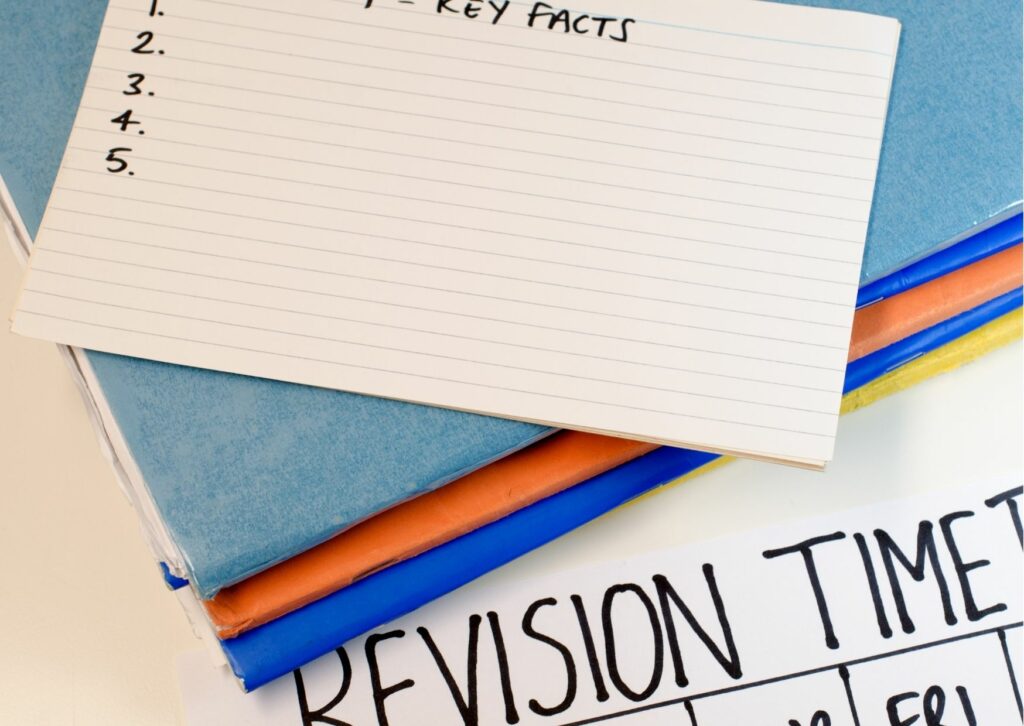Stop! Before you plan a revision timetable, read these tips on what to include (and what not to include). Make your study schedule really work for you.

Google ‘revision timetable’ and you’ll be hit by over 204 billion results and a screenful of pretty printable timetables, but exactly which is the best way to plan a revision schedule?
The answer is simple: find a way that works for you. It IS possible to revise without getting bored and even revise without getting distracted, even though it’s not something you’d add to your bucket list.
Spend some time reading through our exam revision tips and carefully plan a revision timetable. That way you’ll find revision easier than you think.
How To Prepare Your Revision Timetable
Know what you’re up against
There are plenty of past SATs and Eleven Plus papers out there to show you the kinds of questions you should be aiming to answer. Don’t get too hung up on remembering the answer to each question – they change every year. Get a feel for the question subjects, level and the knowledge you need to answer that kind of question. If you find something tricky make a note of the topic and consider what you’d need to learn to make it easier.
Set Goals and Desired Outcomes
Setting achievable goals is not just important for exam revision. It’s an essential life skill too. If you have a really large goal, for example, to use a range of punctuation appropriately, break it down into a smaller set of mini-goals: using capital letters and full stops, using commas, using speech marks, using parentheses… Practise each of these skills as its own challenge.
Be Realistic About Your Timetable
If you are used to Scouts on a Tuesday night and footie with your mates on a Thursday after school then don’t think that you should stop doing these to squeeze in more revision. Everyone needs downtime too. It’s scientifically proven to support our learning!
Reward Yourself For Learning
Be reflective about your own learning and progress and make sure that you factor in rewards for your effort and achievements. Rewards don’t have to be huge. It could be something as simple as a favourite snack, a new comic or some special family time.
Use Google Calendar To Set Reminders
I am not sure I’d make it to the end of the day without Google Calendars and Trello to organise me these days. There’s lots of free tech around to help you set a regular schedule and give you timely reminders; more useful than a paper timetable that ends up as a forgotten scrap under a pile of books. Once you’ve organised your revision, use one of these resources to set a schedule and set up a daily email reminding you of your schedule each morning.
Study Your Hardest Subjects Too
It can be tempting to study your favourite or easier subjects more than those trickier topics, but remember, they will still be there on the exam paper waiting for you! Try to study the harder subjects earlier when your mind is still fresh and able to absorb new information more easily.
Start Early
Starting your revision schedule with plenty of time ahead of you means that you have much more time to revise. Pacing revision across a number of months can also give you extra time to think about the topics you’re finding hard and work out a strategy to overcome them. No last minute cramming here! Not sure about the topics? You can download our Year 6 Maths Topics and Year 6 Writing Expectations documents completely free to get you on your way.
Use Short, Sharp Bursts Of Revision
Our brains are stack-full of neural pathways and each time we learn something new, we store it away along one of them. The more we recall the information, the wider that neural pathway becomes and the easier it becomes to rapidly recall our new knowledge and skills. Revising the same topic for 20 minutes each day over 5 days will improve your memory much more than one 100 minute session.
Ask Your Family And Friends To Support Your Study
Having people around you who know your goals and can encourage and congratulate you as you work towards them is great for motivation. Make sure your family and friends know what you are hoping to achieve so they can support you on your journey.
Don’t Worry About Others
The world is full of people who are faster, brighter, taller, stronger… but really they are just DIFFERENT! Set your own agenda and goals and don’t be swayed by others who seem to know more about a topic you’re struggling with. More likely than not, they’ll be struggling with something you find easy. Comparing yourself to others can lead to negative thinking, so just stick to your schedule built for your individual goals.
Create A Distraction Free Revision Zone
Find a quiet place to revise. Try to make it a space where everything that you need is within reach and distractions such as other family members, TV or busy goings on can’t put you off your work. If you do find yourself getting distracted then walk away for a five minute breather and come back with a fresh head.
Keep Going
Not many of us are excellent at something the first few times we do it. Getting really good at anything takes perseverance and determination. Look at any sports personality or person at the top of their game and you’ll find hours of hard graft and practice behind the scenes. So why would spellings, long division or punctuation be any different? Keep going and every now and then, look back at the progress that you’ve made. You’ll see incredible progress just from working hard.
Believe In Yourself
This is my top tip! As Dr Seuss would say, there is no one more ‘You-er’ than You. And you (just like anyone else) really can achieve marvellous things in your life with a little hard work and dedication. It can sometimes feel like this exam you’re revising for will define the rest of your life, but in my experience that’s rarely true. People with the right attitude get where they want to in the end. Thomas Edison, Richard Branson, Walt Disney and even Albert Einstein all did well enough without exam success and what more proof do you need than that!
Whichever template you choose to plan your revision timetable, stick to these ideas and you’ll find studying can be empowering, enjoyable and help you to reach the goals you set yourself.
